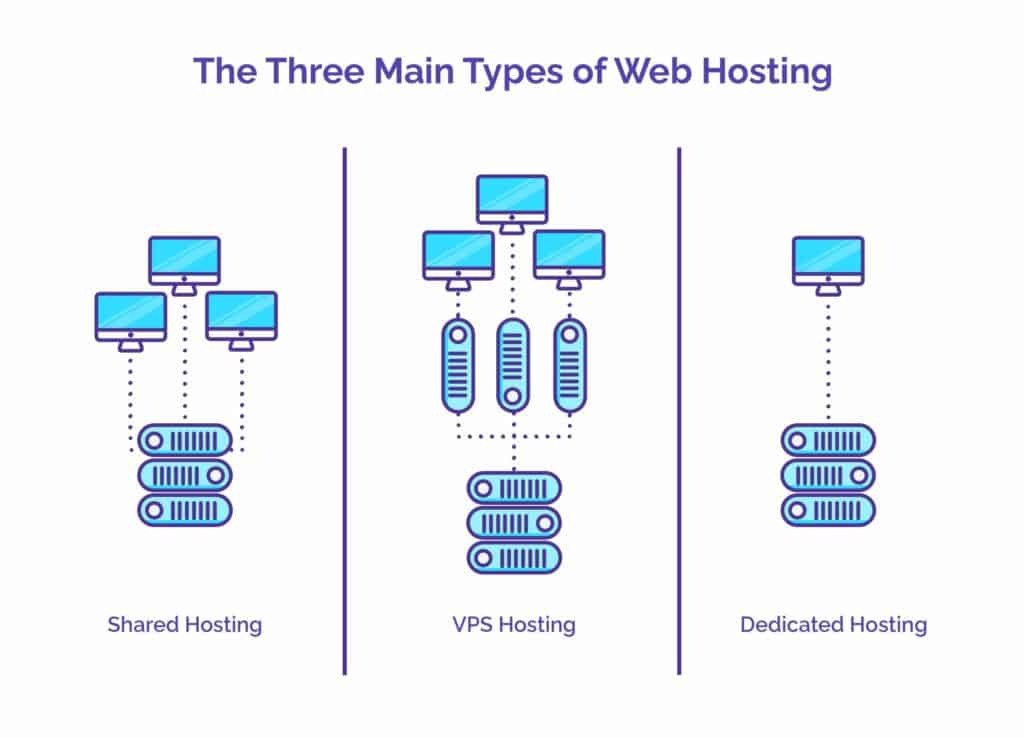With managed hosting, your business receives everything it needs to scale, so you can focus on growing your business. In addition, managing your website's server-side features like SSL certificates and databases gives you significant control over how your website functions and the look and feel it projects to your potential clients and customers.
You don't have to manage any servers, hardware, or bandwidth in managed hosting. Managed hosting is perfect for individuals and small businesses who need a web presence but don't have the time to learn how to set up servers, maintain them, and monitor them.
Review The Best Hosting Providers
Find out more about managed hosting now in a brief article.

Defining managed hosting
You managed to host means that the provider manages everything on your behalf – web server configuration, content deployment, email management, etc. All you have to do is focus on running your business.
For example, you don't need to manage the software and technical infrastructure that powers your business website or application, nor do you need to worry about managing backups or security. It would be best if you focused on growing your business.
Furthermore, because managed hosting is usually billed every month, it's ideal for small businesses that don't need to worry about paying for additional servers or software licenses. Managed hosting is a choice for:
- Small businesses
- High-traffic online store
- Businesses considerate about security
- Websites require back-end needs
However, before you start your search, it's essential to understand the differences between managed hosting and unmanaged hosting.
Different types of hosting services
There are many kinds of web hosting, such as shared hosting, cloud hosting, VPS hosting, and more. In shared hosting, many people share a single space like a house. They pay on a shared basis.
Virtual Private Servers (VPS) hosting is like living in a condo where you share specific resources with your neighbors but are mainly responsible for your property. You can also rent a room from Amazon's cloud-hosted storage. For example, it's not your permanent home, but you have a place to stay.
Dedicated hosting is when you own a home, which means others cannot have access to your resources. Ultimately, the best approach is to go with a managed hosting company. You'll have someone on your team to take care of the details so that you can focus on your business and grow. You can focus on your business.

How fully managed hosting works
The managed hosting solution is a combination of technology and support. The managed dedicated hosting entrusts your business to a third-party supplier. A third-party service provider is a company that administers, manages, and supports your site. The company that runs your website's hosting environment is a web host.
Maybe you're already an established eCommerce business, have an excellent idea for a new product, or have a passion for selling. Whatever the reason, here's how to take that next step with an online business.
It doesn't matter why you're looking for a web hosting provider. Every provider will constantly manage and optimize your website's infrastructure.
Some features of managed hosting
There are many benefits of managed hosting. Managed hosting is more than just hosting. It's a complete solution that provides a web server, control panel, email, firewall, and backup tools.
A managed hosting company is responsible for software and hardware setup, configuration, monitoring, updating, technical support, and maintaining the system.
Managed hosting solutions can be customized to meet the specific requirements of your business. However, they cover general features like:
Technical support for dealing with problems
Managed hosting companies need system administrators, technical staff, and network operations engineers specialized in various technologies. Their investment in their employees ensures long-term customer satisfaction and better service for their businesses.
Security from cyberattacks
A managed hosting provider provides a suite of services to secure your company's digital assets. They protect your data from hackers, scan for viruses and spam, and ensure physical security. Customer-managed hosting providers need to know how to secure their customer's data and information with sensitivity.
Most web hosting companies employ enterprise-grade firewall, antivirus, and network security solutions to protect their networks. Only authorized personnel are given access to sensitive files.
- Firewall configuration
- Spam filtering
- Virus scans
- Operating system upgrades
Ultimate Relaxation
The #1 benefit of using managed hosting services is you can have peace of mind knowing that your website is getting the best care possible.
You'll never have to worry about downtime or security issues with a cloud-based solution. You won't have to worry about your developer being away on vacation or having to work on another project.
Fast load times
Whether you sell products or services, providing the best user experience is essential to your success. Fast loading sites mean great user experiences, which means your competitors are doing things right. But, they don't need to worry because you can have the same excellent user experience for less!
It would be best if you didn't spend all your time designing your site. You should also consider other things, such as what products you want to sell, what type of information you need to display, and how you want to promote your business. The web server is currently overloaded.
Monitoring Servers
The most important part of maintaining a server's performance and security is scanning its servers for errors or potential threats. A managed host provider ensures the minor glitches in your website are fixed before they become big problems.
Data breaches are always happening, and they're a serious concern for any company that uses sensitive information.
Automatic and manual backups
If you want your website to be reliable, you should ensure your data is saved even if your website goes down due to unforeseen events. A good company will keep your data safe by backing it up and giving you a recovery plan in a disaster.

Automatically managed updates
The software updates themselves are automatic. You don't need to check them or install them manually. Your software should check for available updates and install them automatically, without your intervention.
Time Savings
The software updates themselves are automatic. You don't need to check them or install them manually. Your software should check for available updates and install them automatically, without your intervention.
Cost Savings
When choosing managed platforms, companies trade capital expenditures for operational expenditures to eliminate capital expenses and costs associated with on-premise infrastructure and maintenance.
Hosting services requiring less technical expertise to manage to have higher startup costs, but the service providers often make the cost up to customers in reductions in overall expenses.
IT Support
This could be the most comforting feature offered by a managed hosting provider. Many reputable business services providers will provide support via telephone operators, email responders, and live chat agents 24 hours a day, 7 days a week.
Server Maintenance
Server maintenance is a hectic full-time job that eats up your time like nothing. Managed hosting providers do an excellent job of keeping your server's lifecycle from straining your IT staff.

Time saver
You can spend more time on your business while maintaining and managing it. Although this may be true, spending more time on maintenance is impossible. In the real world, there's no free lunch.
You can't spend more time on maintenance and expect your business to grow. You need to make sure that you balance time spent on maintenance and time spent on growth. If you spend more time on maintenance than growth, you will spend less time on the growth side.
Reduced risk
An effective strategy is to reduce risk to an absolute minimum. Today's digital enterprise should focus on risk reduction rather than simply dealing with disruptions after they occur.
If you're running a successful online business, it takes a lot of upkeep on the back end to make sure that: your site is up to date, the site is secure, you're not the target of a cyberattack, and the correct type of traffic is flowing through your site.
Hiring an outsourced web developer can be a great way to ensure that the part of the job you want to be done is done consistently and well.
Flexible up-to-date technology
When choosing a hosting service, you want a company that keeps up with the latest technology and updates so you can use all your tools to their full potential.
Managed hosting is an effective solution to your IT infrastructure problems. It embraces flexibility. Managed hosting solutions are tailored to each company's needs, so it is essential to consider your needs before choosing a managed hosting service.
Excellent performance and high-speed
Shared hosting is great for sites with basic needs. It can also help you install additional software and install extra modules.
On the other hand, managed hosting solutions only provide you with the features you need to run your site. This boosts the speed of the website.

IT Savings
You'll feel better about not having an IT professional on staff when you do not need their services, but you'll want them on board quickly.
Being able to outsource your IT infrastructure to a managed hosting provider allows you to have the freedom to either assign the duties to the in-house IT team or, if there is no other role for IT, reduce the position to a part-time or on-call role.
Checklist of choosing a managed hosting company
Before signing on with a hosting company, be sure to check:
- A managed hosting company should have a professional team to support it technically.
- A managed hosting company should have its hardware. This is becasue if the company doesn't have the hardware, they need to rent it and risk your security.
- It should have a customized setup.
- It should be able to move your data to another server if any other server is down.
- Check if the company has features required for your business or not. Do specify your goals and talk about everything in the whole framework to learn whether the hosting provider is giving services or not.
Managed WooCommerce Hosting
Online shopping is one of the fastest-growing industries globally, changing the face of retail forever.
The performance of your website can be improved dramatically if you're using a WooCommerce hosting package with Managed WordPress.
The trick to creating a good hosted eCommerce site is that while the WordPress platform works excellent for cached sites, an online store doesn't work the same way.
Managed WordPress Hosting
If you're interested in running a WordPress website, you know it's a great platform. WordPress is a web content management system (CMS) that allows you to easily and quickly build professional, functional websites. It offers various templates, plugins, features, and tools.
WordPress plugins are not all created equal. Most people don't even realize there's an upgrade process until it's too late. Over 91,000 WordPress attacks happen per minute, targeting sites of all sizes.
Managed WordPress eliminates many of these concerns since you'll have complete control over your site and update it yourself.

Comparisons
Managed Hosting vs. Public Cloud
You don't need to host on Amazon's infrastructure if you have the money to secure and manage your dedicated servers and data centers. However, a public cloud service would make sense if you don't have the money or the time to set up and manage your servers and data centers.
In managing hosting, you'll monitor your traffic, configure your firewall, set up disaster recovery, back up your data, run backups, manage your systems, scale up and keep your servers and software patched and updated.
Managed Hosting vs. VPS Hosting
If you're looking for a VPS with all the bells and whistles but don't want to pay the price tag for a dedicated VPS solution, an unmanaged VPS might be what you're looking for.
If you want a faster, smoother, more secure environment for your website or web app, we recommend that you use our managed VPS hosting.
You might consider the public cloud if you have the time and skills to secure and manage your own servers 24/7 but don't want to invest in servers. It's a good solution if you can afford the cost of the service.
Conclusion
In conclusion, Managed Hosting is a cost-effective way of managing your web hosting services. It includes all the essential features of managed hosting with the added advantage of getting a dedicated team of experts to manage the hosting.
You will enjoy maximum uptime and performance without any hassle of maintaining and updating the servers. It gives you complete control of your website and server and full access to all the tools and features required for running an online business.
Managed hosting is a service whereby your web host contains all aspects of the server and network infrastructure, including configuration, security, monitoring, maintenance, and patching.
With managed hosting, your hosting provider maintains the hardware and software components that power your website, ensuring it is always ready to serve your visitors 24/7/365. This means you no longer have to manage the individual components of your website or worry about things like software updates, security patches, or site performance.
Managed hosting is the best choice for many businesses and organizations that can no longer dedicate the time and resources needed to run and maintain their servers.
To review the best hosting services, click here.